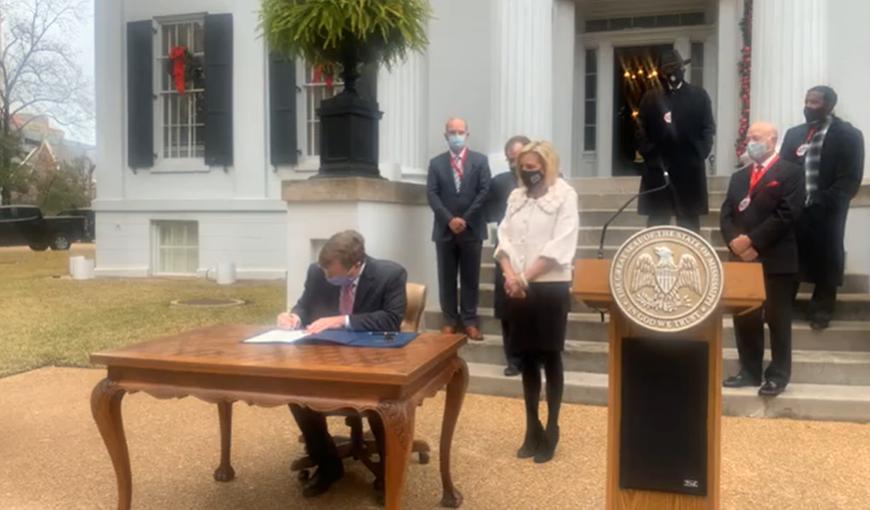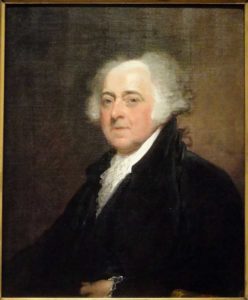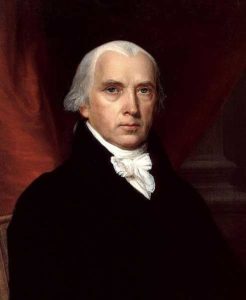Miss. Gov. Declares Sunday a Statewide ‘Day of Prayer, Humility and Fasting’
 JACKSON, Miss. — Mississippi Gov. Tate Reeves announced on Wednesday that he is declaring this Sunday, Dec. 20, a statewide “Day of Prayer, Humility and Fasting” to seek God before the beginning of a new year.
JACKSON, Miss. — Mississippi Gov. Tate Reeves announced on Wednesday that he is declaring this Sunday, Dec. 20, a statewide “Day of Prayer, Humility and Fasting” to seek God before the beginning of a new year.
“As we close out this year, I felt the need to go to God in prayer for our state,” he stated during a press conference outside the governor’s mansion. “We know that there is power in prayer. In fact, it is what God commands us to do.”
Reeves noted that 2020 has been a difficult year for many due to the COVID pandemic and read from Romans 12, which urges Christians to be “joyful in hope, patient in affliction and faithful in prayer.”
He outlined that in light of these matters, he decided to sign a proclamation designating Sunday as a statewide day of prayer.
“As we’ve done throughout the history of this country, we will go to the Lord and ask for His protective hand over us as we conclude 2020 and as we enter the year 2021,” he explained.
David Tipton, the pastor of The Pentecostals of Grenada, then read the proclamation and led those listening in prayer. The document highlights that American presidents such as John Adams, James Madison and Abraham Lincoln likewise issued proclamations calling for a national day of prayer, humiliation and fasting.
“[W]e acknowledge our trust in God in times of distress and the continued need for God’s wisdom and protection for our state and our nation,” it reads. “[A]s Scripture instructs that the beginning of wisdom is the fear of the Lord, we seek wisdom and will strive to walk humbly in reliance on God’s providence so that we may act with justice, courage, kindness and love, through all circumstances.”
“[W]ith trust in God, we, the people of Mississippi, acknowledge our many rich blessings, recognize our own transgressions, and in the face of challenges that may lie in the days ahead, we further acknowledge the need to pause in humility to seek God’s guidance, wisdom and favor.”
View the proclamation in full here.

As previously reported, on March 23, 1798 — less than 12 years after the signing of the U.S. Constitution — John Adams, the second president of the United States, called for a day of national repentance, prayer and fasting.
“[T]he safety and prosperity of nations ultimately and essentially depend on the protection and the blessing of Almighty God, and the national acknowledgment of this truth is not only an indispensable duty which the people owe to Him, but a duty whose natural influence is favorable to the promotion of that morality and piety without which social happiness cannot exist nor the blessings of a free government be enjoyed,” he wrote.
Read Adams’ proclamation in full here.

James Madison, the fourth president of the United States, similarly called for a national day of prayer on July 9, 1812.
“I do therefore recommend the third Thursday in August next as a convenient day to be set apart for the devout purposes of rendering the Sovereign of the universe and the Benefactor of mankind the public homage due to His holy attributes; of acknowledging the transgressions which might justly provoke the manifestations of His divine displeasure; of seeking His merciful forgiveness and His assistance in the great duties of repentance and amendment, and especially of offering fervent supplications, that in the present season of calamity and war, He would take the American People under His peculiar care and protection.”
Read Madison’s proclamation here.
In the midst of the Civil War, President Abraham Lincoln proclaimed a national fast day in 1863, urging Americans to repent of their sins before God.
“[I]t is the duty of nations as well as of men to own their dependence upon the overruling power of God, to confess their sins and transgressions in humble sorrow, yet with assured hope that genuine repentance will lead to mercy and pardon; and to recognize the sublime truth, announced in the Holy Scriptures and proven by all history, that those nations only are blessed whose God is the Lord,” his proclamation read.
“[I]nsomuch we know that by His Divine law, nations like individuals are subjected to punishments and chastisements in this world, may we not justly fear that the awful calamity of civil war, which now desolates the land, may be but a punishment inflicted upon us for our presumptuous sins, to the needful end of our national reformation as a whole people,” Lincoln said.
Read Lincoln’s proclamation in full here.
Become a Christian News Network Supporter…







Comments are closed.